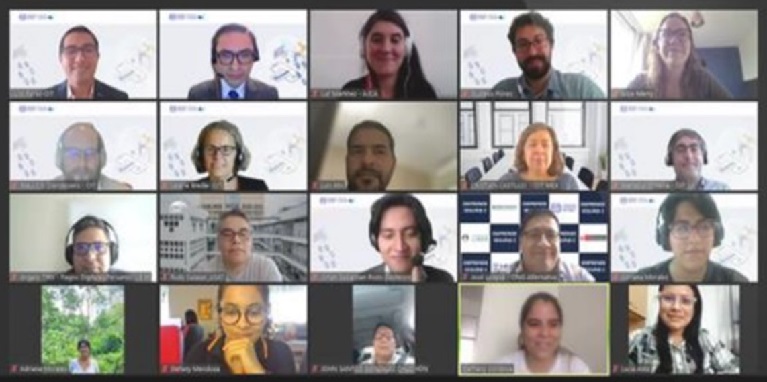Contact us: digitalwages@ilo.org
Digital wages for decent work in Peru

On April 28, 2022, 25 representatives from government entities, workers’ and employers’ organizations, and digital payment and financial service providers discussed the findings of a rapid assessment on digital wages for decent work in the sectors of agribusiness and gastronomy of Peru. This meeting was organized by the ILO’s Global Centre on Digital Wages for Decent Work and the ILO Country Office for the Andean Countries.
Exploring digital wages in agribusiness and gastronomy
The rapid assessment explored the opportunities for the digitization of wages in Peru, that is, the payment of wages in bank accounts, mobile wallets, or prepaid cards. The study is based on an economic and legal analysis of the labour and financial context, interviews with 32 key informants, and a series of semi-structured interviews and focus group discussions with 16 enterprises and 51 workers from two sectors: agribusiness in Lambayeque, La Libertad and Piura; and gastronomy in the department of Cusco.
Do digital wage payments really lead to financial inclusion?
In agribusiness there is a strong contrast between an agro-export sector and a more traditional sector. Exporting enterprises, mainly fruit and vegetables, have formalized and adopted technology for their crops and personnel management. They digitized their wage payments because of the demand for quality certificates. The traditional sector is mostly made of small and medium-sized business owners who are not established as enterprises and who pay wages in cash. For workers in the agro-export sector, the digitization of their wage payments is not necessarily a channel for the effective use of financial services. The withdrawal of their income on payday is the most common behaviour, even among the most banked and digitized segments.
Despite the rapid adoption of digital payments, wages are still paid in cash
In gastronomy, the digitization of payments was promoted significantly through the use of POS and mobile wallets such as Yape and Plin. Despite this high digitization of payments, cash-based wage payments to the workers prevail, as well as to some suppliers, particularly among small restaurants, which are the majority. Unlike agribusiness, the formalization of restaurant businesses in gastronomy is not so closely related to the digitization of their accounting and payments.
Opportunities
Opportunities to expand digitization to wage payments in small gastronomy businesses

To promote digital wages in this type of enterprises, it is essential to increase a banking culture through greater financial education at all levels, better information on digital financial products and the expansion of the use of digital wallets. Likewise, policies for the formalization of enterprises should be accelerated.
Opportunities to deepen the financial inclusion of workers in agro-export enterprises
There is an important role for public and private financial institutions to facilitate access to and use of digital wages and associated financial services. The authorities need to define clearly and promptly the rules that would give vulnerable workers and enterprises a greater access to bank accounts to receive or pay wages. On the other hand, workers and employers must have clear and complete information on the advantages of the financial products and details on how to use and manage them.
Opportunities to accelerate the responsible transition to digital wages
It is necessary to strengthen the coordination of national and local initiatives that aim to improve financial inclusion, digitization of enterprises, and formalization of employment, and to promote social dialogue on responsible digital wage payments. It is essential to expand the financial infrastructure in remote geographical areas and develop a favourable regulation for the Fintech sector and the use of electronic money. Likewise, there is a need for more innovations in the supply of salary accounts and other financial services for workers.

“The study shows important advances in the availability of digital financial services; however, much remains to be done to promote the digitization of wages and, at the same time, ensure that digital wage payment solutions advance the well-being of workers, the development of sustainable enterprises and the respect of workers’ rights.” Italo Cardona, Director of the ILO Country Office for the Andean Countries.
Click here to see the presentation of the findings in Spanish.
